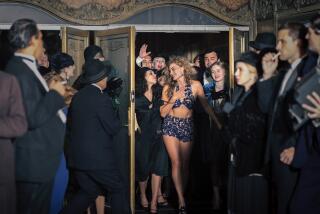Obituaries : Anna Sten; Actress Imported by Goldwyn
- Share via
Anna Sten, the exotic and beautiful Russian actress brought to Hollywood by Samuel Goldwyn as a second Garbo but eventually tagged “Goldwyn’s folly,” has died. She was believed to be 84.
Miss Sten, who had lived in Beverly Hills for many years after her acting career sputtered out, died Friday in her Manhattan home of cardiac arrest.
The American producer brought her to Hollywood in the early 1930s and waged an extensive publicity campaign, determined to create another Garbo or Dietrich aura around the sultry beauty.
In 1934, Miss Sten starred in Goldwyn’s “Nana” and “We Live Again,” and a year later in his “The Wedding Night” with Gary Cooper, Ralph Bellamy and Walter Brennan.
Critic Leonard Maltin, commenting in his 1993 Movie and Video Guide, assailed the first film as “producer Samuel Goldwyn’s first attempt to make a new Garbo out of exotic but wooden Sten.” He dismissed the last as “producer Samuel Goldwyn’s third and final attempt to make Anna Sten a new Garbo.”
American audiences never warmed up to Miss Sten. Faced with poor box office response, Goldwyn conceded that he had made one of the few mistakes in his career--a costly one that led to Miss Sten’s sobriquet in the industry as Goldwyn’s folly. He terminated her contract.
Historians have variously recorded the actress’s date of birth as 1907, 1908 or 1910, but generally accept that she was born Dec. 3, 1908, in Kiev, Ukraine. Named Annel (Anjuschka) Stenskaja Sudakevich, she was the daughter of a Russian ballet master and a Swedish mother.
After working as a waitress, she began her acting career with the Moscow Art Theatre and made her screen debut in the 1927 Russian film “The Girl With the Hat Box.” With a few more Russian films on her resume, she went to Germany where her work in “The Murderer Dimitri Karamazov” caught Goldwyn’s attention.
After Goldwyn dumped her, Miss Sten went to England, where she made “A Woman Alone” and “Two Who Dared” in 1936. She returned to the United States and made a few more films, some for her second husband, independent producer Eugene Frenke.
Her work included “Exile Express” in 1939, “The Man I Married” in 1940, “So Ends Our Night” in 1941, “Chetniks” and “They Came to Blow Up America” in 1943, “Three Russian Girls” in 1944, “Let’s Live a Little” in 1948, “Soldier of Fortune” in 1955, “Runaway Girls” in 1956 and “The Nun and the Sergeant” in 1962.
In 1960, Miss Sten appeared briefly on Broadway as Jenny in “The Threepenny Opera” and toured with the play.
But she devoted most of her later life to semiprofessional painting.
Widowed at her death, Miss Sten had been married to Russian film director Fedor Ozep before her marriage to Frenke.
More to Read
Only good movies
Get the Indie Focus newsletter, Mark Olsen's weekly guide to the world of cinema.
You may occasionally receive promotional content from the Los Angeles Times.








